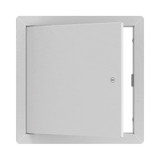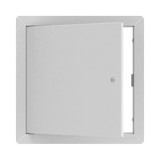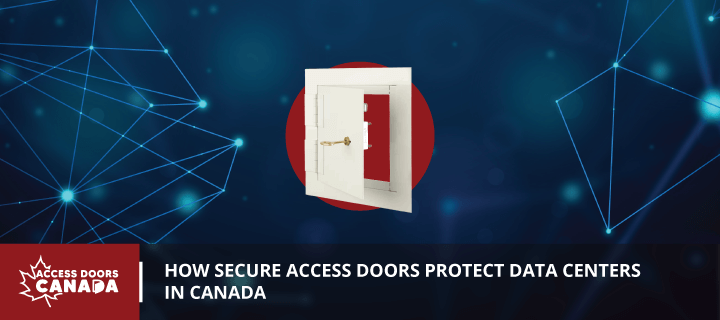How Secure Access Doors Protect Data Centers in Canada
Canadian data centers are crucial to the digital economy but face threats like cyberattacks, intrusions, and environmental hazards. While cybersecurity is important, physical security—especially secure access doors—is the first line of defense. This article provides actionable insights for using these doors in Canada.
Understanding the Threats
Protecting a data center is about more than just firewalls and antivirus software. It's about creating a secure physical environment that prevents unauthorized access and protects sensitive equipment from harm.
Secure access doors and panels are critical to this physical security strategy, acting as the first defense against various threats. Here are some reasons why they matter:
Physical Intrusion
Physical intrusion poses a major threat to data centers, risking data theft, equipment sabotage leading to downtime and financial loss, and espionage for proprietary information. While cyberattacks often dominate headlines, physical breaches remain a real danger, as incidents like copper wire theft from similar infrastructure show.
Environmental Threats
Data centers need stable environments for optimal equipment operation. They are vulnerable to dust, moisture, and temperature fluctuations without properly sealed doors. Robust door sealing and insulation protect against extreme temperature swings, humidity, snow, and ice.
Insider Threats
Insider threats from employees, contractors, or cleaning staff are a significant risk to data centers. Secure access doors and access control systems mitigate these risks by restricting access to sensitive areas based on roles, tracking entry and exit for audit trails, and preventing tailgating through measures like mantrap entries.
Regulatory Compliance
Data centers must adhere to regulations that mandate the protection of personal data from unauthorized access and the necessitating of strong physical security. Established regulations guide robust access control measures for cybersecurity and physical security in Canada.
Key Features of Secure Access Doors for Data Centers
Not all access doors are equal, especially when protecting sensitive data center infrastructure. Secure access solutions for these critical environments incorporate specific features to resist threats.
This section details these key features, emphasizing why they are essential for protecting data centers in Canada.
Door Construction and Materials
Data center access doors need a robust build for security. Solid core construction using steel, composite materials, or other strong components is essential for resisting forced entry. Equally important are reinforced frames securely anchored to the wall and heavy-duty, tamper-resistant hinges to prevent attackers from bypassing the door.
Locking Mechanisms
Strong locking mechanisms are crucial for data center security. Multi-point locking systems, such as those in the ADC-DSB-123SD-L High-Security Panel, offer significantly enhanced resistance to forced entry compared to single-point locks by simultaneously engaging multiple locking points along the door's edges. This force distribution makes prying or kicking the door open much more difficult.
Sealing and Weatherproofing
Sealed and weatherproof access doors are essential for maintaining a controlled data center environment. Effective weather stripping and gasketing protect equipment from environmental damage by preventing air leaks, dust, and moisture intrusion.
In Canada's extreme climate, thermal insulation stabilizes temperatures, reducing cooling loads and energy costs.
Canadian Considerations for Data Center Door Security
While general best practices for data center security apply globally, Canada presents unique challenges and considerations that must be addressed to protect these critical facilities.
Climate Considerations
Canada's extreme and varied climate presents unique challenges, from frigid winters with snow and ice to hot summers. Temperature fluctuations can compromise seals, snow and ice can obstruct operation, high humidity leads to corrosion, and strong winds can impact door integrity.
Regulatory Landscape
Canadian data centers face a complex regulatory landscape for data protection and security. While no overarching standard exists, key influences include PIPEDA, provincial privacy laws, NIST frameworks (Cybersecurity Framework and SP 800-53), and industry-specific regulations.
Local Expertise and Supply Chains
Leveraging Canada's growing network of data center security specialists—suppliers, installers, and consultants—offers significant advantages. Local expertise ensures an understanding of Canada's climate and regulations, while local suppliers provide faster response times for maintenance and repairs.
Working with businesses like Access Doors Canada, specializing in data center access doors in Canada, fosters stronger relationships and supports the domestic economy.
Conclusion
Protecting data centers in Canada requires a multi-layered approach, and physical security forms the crucial foundation. Secure access doors are not merely entry points but vital components of a sound security strategy, safeguarding valuable data and infrastructure from various threats.
Investing in secure access doors is a wise move. The potential costs of a security breach—financial losses, data breaches, operational disruptions, and reputational damage—far outweigh the cost of top-notch physical security. Secure access doors mitigate these risks.
To enhance data center security, consult experts for risk assessments, focus on professional installation and regular maintenance of secure access doors, and stay informed about evolving best practices and regulations.
Don't leave security as an afterthought. Contact us at (800) 679-3405 or visit Access Door Canada today to discuss how you can safeguard your data center.









